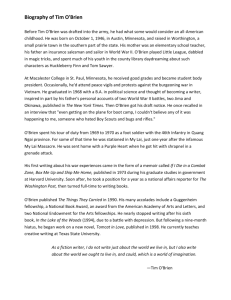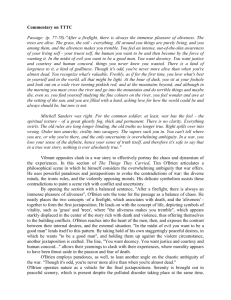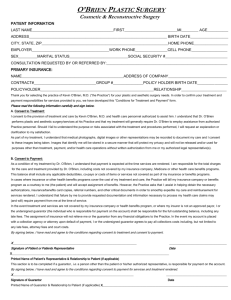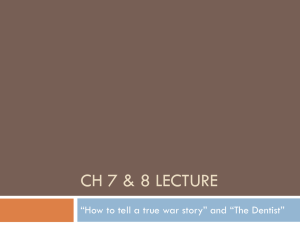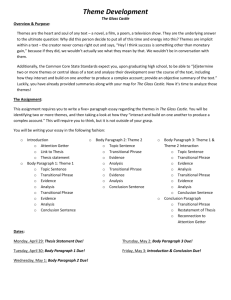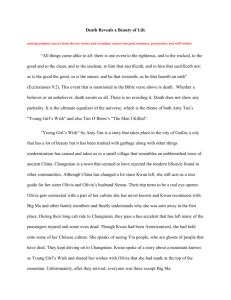The Biography of William Timothy O`Brien
advertisement
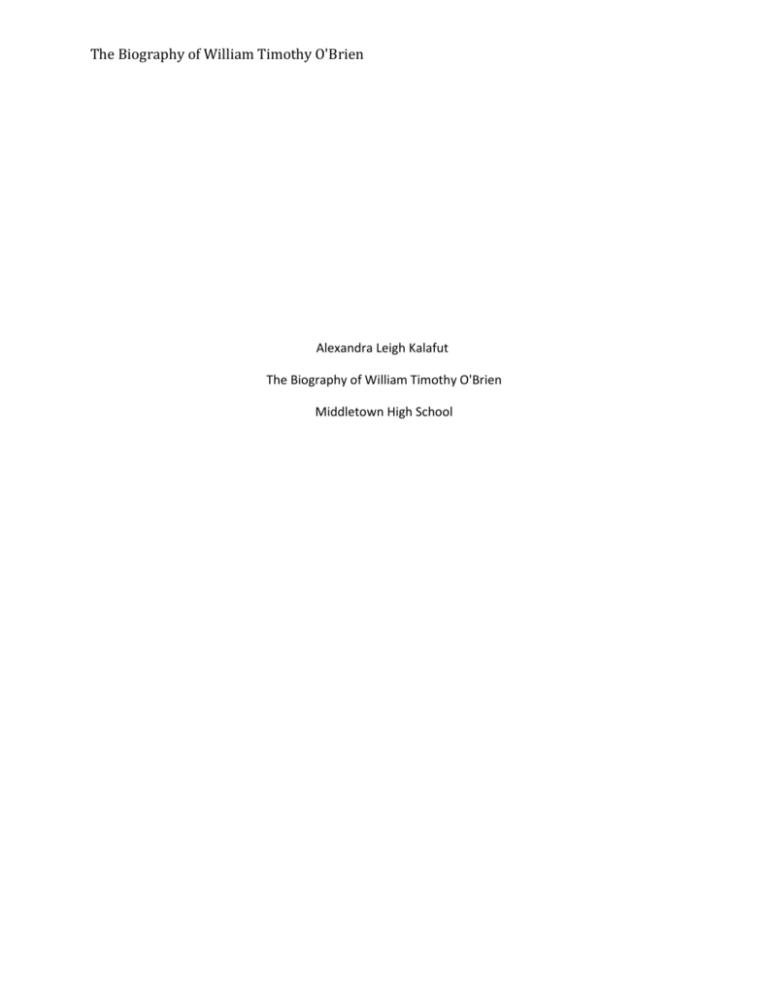
The Biography of William Timothy O'Brien Alexandra Leigh Kalafut The Biography of William Timothy O'Brien Middletown High School The Biography of William Timothy O'Brien Tim O’Brien William Timothy O’Brien was just an average man without the want to be famous. Now, nearly twenty years later, his works have inspired many by expressing the hardships and terrors faced by those who partake in war. His collection has amounted to about twenty six short stories and novels, all representing the Vietnam War and others like it. However, it was not always Tim O'Brien's dream to peruse writing and certainly not to partake in the war itself. William Timothy O'Brien was born on October 1, 1946 in the small town of Austin, Minnesota. He was named after his father, William T. O'Brien, a salesman. His mother, Ava O'Brien, was a schoolteacher. In many interviews, O'Brien describes himself as shy and lonely as a child since he had difficulty making friends. He attended Macalester College in St. Paul and upon graduation was drafted into the Vietnam War. Although he considered refusing the draft, O'Brien changed his mind after considering those fighting with much worse conditions than his own. Tim O'Brien served in the third platoon for two long years and even participated in some of the world's most memorable battles, including My Lai (Quinton Miller, D.,2011). After being affected by the disasters of My Lai, he was awarded the Purple Heart and resigned from war. Once he was back home, he attended Harvard for graduate studies and became a news journalist. Timothy O'Brien used many of his own wartime experiences, settings and other situations in his writing, similar to Ernest Hemingway. Ernest Hemingway, also one of America's most influential writers, has been known as a symbol of O'Brien's writing style. Like Tim O'Brien, Hemingway participated in a war that changed his outlook on his work. He signed up for World War I when he hit the age of eighteen The Biography of William Timothy O'Brien to support the soldiers in the medical field. After an injury on the front line, he was sent back home where he began writing his many famous pieces of our time. Both O'Brien and Hemingway share the same ability to express the horrors and first hand experiences of the front line. This is why many critics claim O'Brien to be representing Hemmingway's choice of style. In an interview, O'Brien said, "I didn't get into writing to make money or get famous or any of that. I got into it to hit hearts, and man, when I get letters not just from the soldiers but from their kids, especially their kids, it makes it all worthwhile." Tim's passion is affecting the hearts and souls of the loved ones and to inform those without the burden of having someone in war understand what they go through. He is most famous for giving the audience a vivid outlook on the events that took place. The stories in which Tim creates makes the reader almost feel as though they were a part of the gruesome events as they unfolded. For example, in The Things They Carried, Tim explains that when the soldier loses his temper after being exposed to his friend's death he is unable to handle himself. Tim explains how this soldier takes out his anger on an innocent buffalo, mangling it to the point where it was unidentifiable as a previously living creature. These epic events unfold the underlying truth within the Vietnam War (Horst, F. 21 April 2011). The Things They Carried seems to be one of Tim O'Brien's most famous books, being nominated for awards such as France's prestigious Prix du Meilleur Livre and receiving the National Book Award in 1979. Although the story may seem like a novel it has been considered by critics as a memoir of a soldier’s life over a vast period of time. The fear of shame as motivation for the soldiers appears to be an occurring aspect of the book. O'Brien emphasizes this theme through his characters and previous experiences. Tim O'Brien himself has said that The Biography of William Timothy O'Brien the only reason he went to war rather than fleeing to Canada was due to the shame his family and friends would punish him with. His characters also have similar stories including Jimmy Cross, a young soldier who went to war under the influence of his friends. He later has to lead his platoon through the jungles of Vietnam blindly, causing them danger. It is explained that Jimmy Cross stays behind making sure everyone can get to safety as a result of fear of letting down the soldiers and causing them pain. O'Brien uses examples like these throughout the memoir to show that fear is a misunderstood but inevitable factor for soldiers in war. Throughout all of his writing, it has been evident that Tim O'Brien likes to write in a journalistic fashion. Many of his published works are the day by day stories documented through a soldiers perspective. He enjoys surprising his audience with intense and horrifying stories directly from the front line experiences. O'Brien likes to express his personal understanding of war itself. Unlike the glorification and heroism aspects often associated to war before Vietnam, O'Brien uses his work to inform readers that war does not only affect the soldiers for just a short time but these horrors will remain with them throughout the rest of their lives. Tim O'Brien even tells of his personal experiences, explaining that twenty years later he can still remember the lingering feelings and the worst of his memories from his time in service (O'Brien, T. 1990). The critics of Tim O'Brien's works have been of mixed emotion. Some proclaim that his works even bring them sympathy for the soldiers who experienced these horrors. However, others believe he focuses too much on the bad aspects of war rather than the victory and protection that the soldiers provide. O'Brien's response is, "`My whole life, I never seen The Biography of William Timothy O'Brien anything like it. . . .' `Well, that's Nam . . . Garden of Evil. Over here, man, every sin's real fresh and original." This quote from a previous interview proves that O'Brien will never stop trying to express the hardships placed on the soldiers until everyone understands his purpose for writing. He tells the story exactly as he sees it and there is no room for a cookie cutter version (Holt, Reinhart and Winston, N.D). Tim O'Brien's artistic abilities to write wonderful, thrilling novels has informed many around the world. His writing is very significant to anyone who enjoys a realistic point of view about heart wrenching events told through firsthand experience. His passion for informing his audience of the worst in human nature is a true inspiration. The Biography of William Timothy O'Brien References Horst, F. 21 April 2011. Ernest Hemingway- Biography. The Nobel Prize of 1954. http://nobelprize.org/nobel_prizes/literature/laureates/1954/hemingway-bio.html Holt, Reinhart and Winston. Tim O'Brien. Tim O'Brien- Author Biography. http://eolit.hrw.com/hlla/authorbios.html O'Brien, T. 1990. The Things They Carried. New York: Broadway Books. Quentin Miller, D. 2011. Tim O'Brien Biography. Tim O'Brien's Biography: York, Vietnam, Stories, and Press. http://biography.jrank.org/pages/4637/O-brien-Tim.html Hulse, Caroline. 1999-2011. Ernest Hemingway. The Greatest of Writers: Ernest Hemingway. http://www.ernest.hemingway.com/
